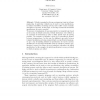Free Online Productivity Tools
i2Speak
i2Symbol
i2OCR
iTex2Img
iWeb2Print
iWeb2Shot
i2Type
iPdf2Split
iPdf2Merge
i2Bopomofo
i2Arabic
i2Style
i2Image
i2PDF
iLatex2Rtf
Sci2ools
119
click to vote
AMAST
2000
Springer
2000
Springer
Distance Functions for Defaults in Reactive Systems
Default reasoning has become an important topic in software engineering. In particular, defaults can be used to revise speci cations, to enhance reusability of existing systems, and to allow a more economic description of systems. In this paper we develop a framework for default speci cations of reactive systems. We present a formalisation of non-monotonicity in temporal logic based on the notion of default institution. Default institutions were de ned as an extension of institutions in order to allow partial reuse of existing modules. The semantics of defaults is given by a
generalised
distance between interpretations. In this way, by de ning a pre-order between temporal morphisms and using temporal logic as a speci cation language, we get a way of handling defaults in speci cations of reactive systems. We illustrate the developed formalism with an example in which a speci cation is reused, but where the new behaviour contradicts the initial speci cation. In this example, the initia...
| Added | 01 Aug 2010 |
| Updated | 01 Aug 2010 |
| Type | Conference |
| Year | 2000 |
| Where | AMAST |
| Authors | Sofia Guerra |
Comments (0)

